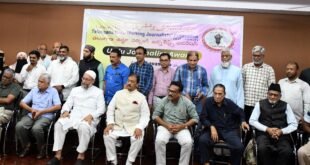By: Asad Mirza
The condemnation of the controversial CAA and the violence perpetrated against Muslims protesting against the Act, by the international community continues unabated. Iran has become the latest country to join the ranks of the European parliament, the British parliament, UNHCR, Pakistan, Turkey and Malaysia to criticise the controversial law. Iran in a surprising move continued its criticism against India following Delhi violence and last week ‘advised’ Delhi to stop the massacre of Muslims ‘in order to prevent India’s isolation from the world of Islam’. In Bangladesh, the Twitterati or the social media activists are opposing the forthcoming visit of the Indian prime minister to Bangladesh. Protests against the violence have also been reported from Afghanistan, a country traditionally billed as India’s friend. Mahathir Mohamed who was PM till recently launched a campaign against India on CAA and moves in Kashmir. Turkish President too has been vocal against India on Kashmir and Delhi violence.
Iranian Supreme leader Ayatollah Khamenei tweeted three days after Iranian Foreign Minister Javad Zarif criticised India for Delhi violence. In a tweet Ayatollah Khamenei expressed solidarity with Indian Muslims and cautioned that violent action against them could lead to ‘India’s isolation from the world of Islam.’
In the UK, a heated debate saw, British Members of Parliament condemn the recent violence against Muslims and the CAA. Khalid Mahmood, an MP from Birmingham and the most senior Muslim member of the British parliament initiated the debate, when he raised an urgent question on the situation in India.
UK’s Minister of State in the Foreign and Commonwealth Office (FCO) Nigel Adams informed Parliament that events taking place in New Delhi were very concerning and the situation there is still tense. British authorities, including a minister in the foreign office, Lord Tariq Ahmed, are in constant contact with authorities in India, he said. Mahmood, in response, termed Adams’ briefing ‘facile’. He further added that not only the Muslims but even the secular Hindus who are protesting are also being targeted by sectarian hate mobs backed by ultra nationalist politicians from the ruling BJP. Mahmood also criticised those who see India as one of the global leaders of the 21st century or with a permanent place in the UN Security Council.
However, the European Union parliamentarians have voted to postpone a vote that criticises the CAA and GoI’s Internet lockdown in Kashmir. Six groups representing 626 of 751 members of the European Parliament had brought the draft resolution. The resolution had described the CAA as ‘fundamentally discriminatory in nature’, with one group saying the controversial bill had the potential to ‘create the largest statelessness crisis in the world’.
Now, the vote will be held after Indian Prime Minister’s March 13 visit to Brussels for a bilateral summit. New Delhi has called the postponement a ‘diplomatic victory’. However, the development will suit both sides, observers said, and have described this as a face saving device, as the Europeans may not want to antagonise a big democracy like India.
Commenting on the CAA, the violence and the decision by the Indian authorities not to allow a critical member of the British parliament, entry into India, Talmiz Ahmad, former ambassador is of the view that what the government has done is to deliberately internationalise these three matters in order to consolidate its agenda. With regard to Kashmir, it has brought in foreign elements into the state to project an idea of normalcy in a situation where there is no normalcy whatsoever. Anyone who has questioned the government’s pronouncement has been rejected and treated with considerable disdain and even humiliated.
Rajesh Rajagopalan, Professor of International Politics, JNU opines that instead of working to expand benefits abroad, Indian diplomats will be working harder to limit damage, a waste of India’s precious foreign policy bandwidth. And it provides a talking point for India’s adversaries to question its policies, but much more importantly, its basic democratic credentials. The costs may be limited but the benefits are non-existent.
In its defence the MEA in a statement has said that at this sensitive time, we would urge people not to make any irresponsible comments and not to be influenced by selective and unsubstantiated narrative on the matter. The external affairs ministry has urged international leaders and bodies last week not to make irresponsible statements during such sensitive times.
Incidentally no Arab member of OIC has criticised India so far on violence in Delhi, CAA and Kashmir. One interesting fact is that the condemnation has come from those Muslim majority countries, which are relatively democratic, or at least where foreign policy is responsive to public opinion, they have taken a clear stand against the Indian government’s and ruler’s perceived anti-Muslim policies. The more autocratic countries, which have more room to operate in terms of pursuing purely selfish interests, ignoring human rights record of the Indian leaders, have chosen to either stay silent or actively fete them. Majority of Gulf countries including UAE and Saudi Arabia fall in this category. Intriguingly India has also helped these despotic leaders in their hour of need, latest events at a court in the UK have revealed that Indian special forces commandos aborted a bid by two daughters of the Dubai ruler to flee the emirate. Similarly, there are reports of huge Indian investment in Saudi Aramco, in a bid to support the floundering Saudi economy. Thus quid pro quid continues, and the Indian Muslims will find no solace or support from their co-religionists, who claim to be the saviours of the faith.
Asad Mirza
Asad Mirza is a Sr journalist based in New Delhi.
In his career spanning more than 20 years, he was also associated with BBC Urdu Service and Khaleej Times of Dubai.
He writes on Muslims, educational and international affairs issues.
Email: asad.mirza.nd@gmail.com
 Gawah (The Witness) – Hyderabad India Fearless By Birth, Pristine by Choice – First National Urdu Weekly From South India – Latest News, Breaking News, Special Stories, Interviews, Islamic, World, India, National News
Gawah (The Witness) – Hyderabad India Fearless By Birth, Pristine by Choice – First National Urdu Weekly From South India – Latest News, Breaking News, Special Stories, Interviews, Islamic, World, India, National News



